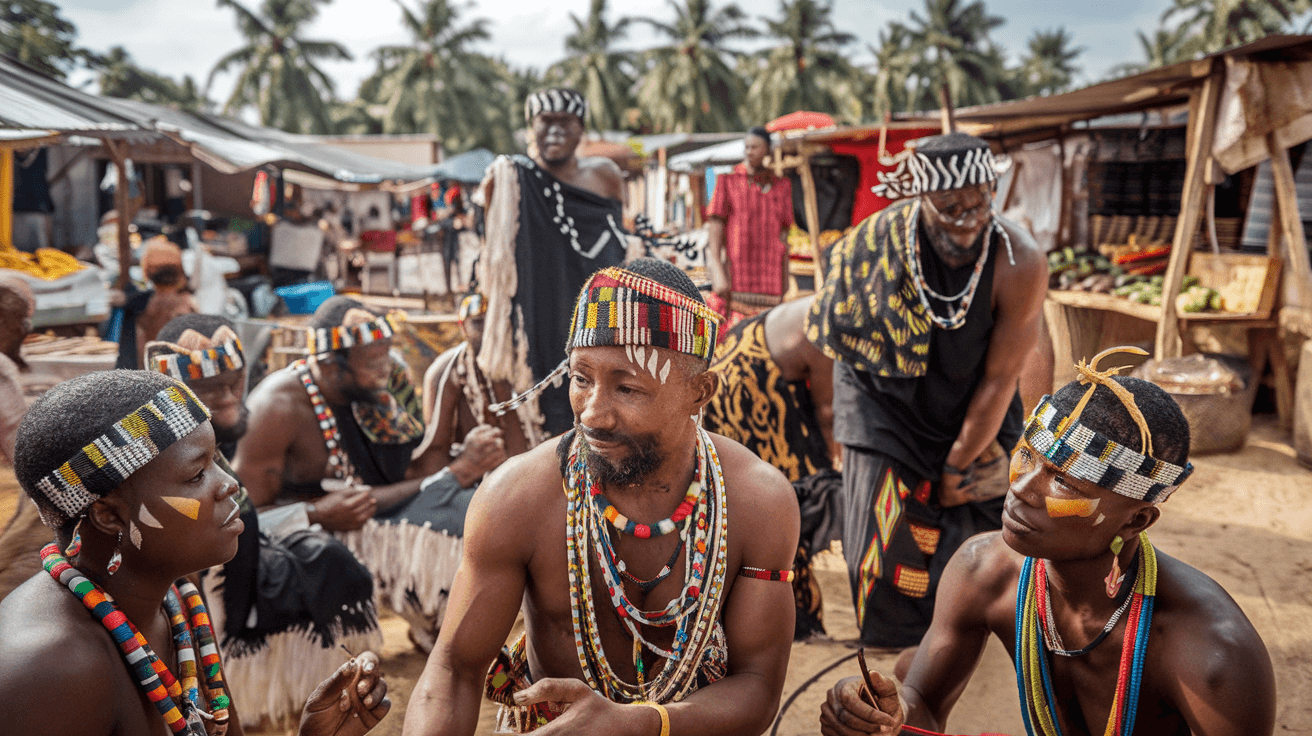Ibibio (self-designation – Ibibio; Bibi, Kwa, Mong), a group of people in the southeast of Nigeria (Cross River basin).
Akwa Ibom State includes: Eastern Ibibio, or Ibibio proper (6.3 million people); Western Ibibio, or Anang (approximately 3 million people); Northern Ibibio, or Enyong (160 thousand people); Southern Ibibio, or Eket (Eket/Ekit – 450 thousand people, Oro/Oron – 190 thousand people, Okobo – 104 thousand people); Delta, or Andoni (Obolo, or Andoni – 318 thousand people, Ibeno/Ibino – 20 thousand people). In Cross River State in the south lives the River Ibibio or Efik (704 people).
They reside in Ghana (64 thousand people, including 30 thousand Efik of whom most live in Accra), as well as in Cameroon (58 thousand people, including 17 thousand Efik who are in departments Ndian and Manyu and Southwest Region) and the Equatorial Guinea (7.3 thousand people in Bioko Island of which most are in Malabo). There is an Ibibio diaspora in Western Europe (predominantly in the UK) and North America. The total population (2022, estimate) counts approx 11.5 million people who all are living in Nigeria, approx 11.3 million.
They speak Lower Cross group languages of the Cross River branch of the eastern subfamily of Benue–Congo languages. The Ibibio languages are the primary languages of Akwa Ibom State, while Efik serves as a language of interethnic communication, widely used in Cross River State. It uses a Latin alphabet based writing system, up until the mid-20th century. The pictographic script Nsibidi had been adopted. Approximately 90 percent of the Ibibio are Christians (Catholics, Lutherans, Seventh-day Adventists, etc.), and the remainder practices traditional beliefs; there are also adherents of Afro-Christian churches and sects (National Church of the Holy Spirit, etc.).
Various migrations led to the creation of the modern Ibibio; the Efik had migrated to the left bank of the Cross River in the 18th century and were later, according to legend, followed by the Andoni who broke away from them. In the 15th century, coastal Ibibio groups encountered Europeans and acted as intermediaries in the slave trade, one of the most significant centers of which was the city of Calabar.
Their traditional culture is characteristic of the peoples of the Guinea subregion of West Africa. The predominant occupation is subsistence manual slash-and-burn agriculture ( yams, cassava, and bananas) and the cultivation of cocoa, oil palm, and rubber plants; among the Andoni and Eket, fishing has a leading place; trade in palm oil and fish has an early development.
There are widespread seasonal jobs on plantations, mines, oil fields, and entities in large cities. Traditional crafts encompass blacksmithing, weaving and pottery; Artistic crafts – weaving, wood carving (is part of the eastern stylistic group of the Guinea coast), beadwork, etc.
The wooden masks of rounded convex geometric shapes that come from Ekpo, a secret society, utilize jagged protrusions on the temples as their distinguishing feature; hair is interpreted as a fringe of plant fibers. The wooden statuettes are large, clumsy sizes; the Oron place statues of the ancestor (Ekpu) of one of their graves – columnar, above 1 m in height, a body that is thickened from the bottom and very short legs with a beard, braided into a braid. The settlements are dispersed, and the Efik and Enyong have multiple large, compact villages. The house is rectangular, of wattle, with clay inside and around.
The traditional kinship institution is realized according to the pattern of agnatic-family communities (ufok – “house”), based on extensive communities (idip ete; “father’s stomach”), patrilineal groups or clans (ekpuk), age groups (nka); secret unions: male – Ekpo, Ekon (hunting), Idion, borrowed from the Ekoi Ekpe or Egbo (“leopard people”), female – Ebre (society of married women). The kinship count is patrilineal; among the Andoni, it’s matrilineal.
Clans are connected by marriage exchange relations. Marriage of second patrilateral cousin is favored. Widespread is the brotherhood (imaan). The kinship terms system is generational type and has plenty of descriptive constructions. A single descriptive term is used for uncles or aunts on the mother’s side of the family, and another term for those on the father’s side, also without regard to gender. Ego siblings are categorized as “children of the father” and “children of the mother”.
The pł and runko functions were by councils of elders and secret unions, chiefly representatives of the Amama, the highest rank of the Ekpo union. Ekpo was also used by the British colonial authorities in southeastern Nigeria as a form of indirect rule.
Many Ibibio people are numbers of the educated, political, religiou5, and business elite of contemporary Nigeria. Cardinal Dominic Ignatius Ekandem (1917–1995), the first Cardinal of Nigeria and Anglophone Africa (1976), was a candidate for the post of Pope in 1978.
Ndem: Ndem as in traditional cults and also references the indiviual spirits of nature: Every person’s spirit has a function. There is a myth surrounding the first human beings (a man and a woman) who, after violating the prohibition of Abassi (an abstract symbol of God), started to grow crops. The leading genres of folklore are formed (fairy tales, songs, legends, proverbs).
